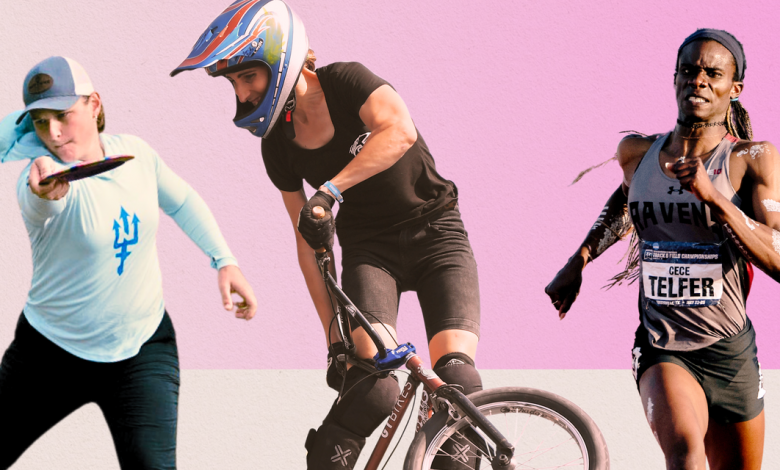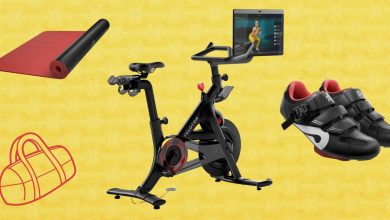3 Trans Athletes on Why Being Excluded From Women’s Sports Is So Devastating

What happens when the sport you love, the one you have spent your entire life dedicated to, decides you are no longer eligible to compete? That is the reality that many trans women athletes across a variety of sports are currently living, one where their dreams of success have been shattered.
Laws to ban transgender athletes at the scholastic level have swept across the US, with 25 states adopting them. At the elite level, policies enacted by sporting governing bodies have impacted the rights and lives of trans athletes in everything from cycling to track and field to chess.
These restrictions often focus on imaginary trans people who are painted as scary boogeymen rather than the real people who are impacted by these bans. In a study published in the Journal of the American Medical Association in June 2023, researchers theorize that the reason trans people face high rates of suicidality and depression may be because they live in a world in which they face immense amounts of bullying and discrimination simply for being who they are. A 2023 study from the Williams Institute at the UCLA School of Law found that 81% of transgender adults in the US have thought about suicide, 42% of transgender adults have attempted it, and 56% have engaged in non-suicidal self-injury over their lifetimes.
Trans athletes have been fighting back in the courtroom, and they’ve been having some success. But these legal battles may be too late for some. Since the Olympics began in Paris this summer, there are women who are watching from home, women who should be competing. Despite new guidelines from the International Olympic Committee in 2021 cautioning against exclusion, some international governing bodies have, in recent years, passed bans on trans women competing in women’s sports if they did not transition before puberty. A new study, released in April and commissioned by the International Olympic Committee (IOC) and conducted by scientists, warns against blanket bans and states that trans women athletes on hormone replacement therapy (HRT) may actually be at a disadvantage over their cisgender counterparts when tested for certain specific metrics.
“Getting rid of the very few of us who are out there is absolutely just taking away the next generation’s ability to see themselves in these positions and want to push themselves to get to that level too,” Chelsea Wolfe, a professional BMX rider, tells SELF. “The repercussions are going to be felt for generations.”
With so much focus on imagined, future situations, the experiences of real people are missed. Here are three of their stories.
Natalie Ryan, Disc Golf
Natalie Ryan is a 30-year-old professional disc golfer from Virginia. She discovered her love for the sport on her second date with her now fiancé, when he took her to a course.
Disc golf, sometimes called frisbee golf, is a flying disc sport with rules similar to golf. Ryan always played in the women’s division and never had a problem, she says. In the period after she became a Pro Disc Golf Association (PDGA) member and before she went pro, in 2019, she says that someone stalked her Facebook page and discovered she was trans, and then they told the other athletes.
“There’s nothing like waking up, going to a tournament, and suddenly the entire field looks at you and treats you differently simply because they learned something,” Ryan says.
As of April 4, 2019, the PDGA had a policy in place for transgender athletes that was in line with an International Olympic Committee policy from 2015, requiring transgender women to have testosterone levels under 10 nanomoles/L in order to compete in the Women’s Pro Open (FPO) division. Ryan had been unaware of the policy when she began playing, but once she found out about it, she submitted all the necessary paperwork to ensure she was in compliance with the rules.
In 2022, Ryan won two Elite Series victories and finished the year in the top 10. But there were people in the sport who didn’t like it. Ryan says she didn’t realize that her identity was beginning to become a concern for other players until it was too late. “The players on tour never even brought it up; they talked about me behind my back,” Ryan says.
In December 2022, the PDGA and Disc Golf Pro Tour (DGPT) passed a new policy banning trans women who had transitioned after the age of 12 from participating in the FPO. Ryan, who had transitioned in adulthood, was effectively banned from the sport, so she filed two lawsuits against the PDGA and DGPT, alleging that their new policy was discriminatory. During the legal process, Ryan found out about a document called the Stockton Declaration; signed by 33 of the 76 women on the pro tour, the letter declared that “competing against male athletes is not fair for women, regardless of whether the competitor may have identified themselves as transgender;” it claimed that cisgender women experience “emotional harm when forced to compete against” trans women; and it stated that, for those who competed with Ryan, “many of us have lost prize money, competitive opportunities, notoriety, sponsorships, and endorsements.”
“I don’t understand why some of them—I thought they were my friends—ended up signing that,” Ryan says. But what really “broke” Ryan, she says, was when she won the right to play in an event in Stockton, California, but was removed from the field of play after the first day of the tournament when the DGPT won its appeal of the decision.
She had been in second place behind four people tied for first place.
“I’ve never been so upset and angry as I was that day,” Ryan says. “I left and then we drove for four days straight to get back to Virginia so that I didn’t have to be anywhere near that place anymore.”
Ryan won her case in Minnesota quickly, as expected, and she was able to compete in the Preserve event in Clearwater, Minnesota. (“I didn’t play well, but I played,” she says.) She finished tied for 14th place. Shortly after that, the PDGA announced changes to the locations of its tournaments for the rest of the year in order to “protect competitive fairness in the FPO division,” essentially moving them to states with stricter regulations against trans athletes, in the hopes of avoiding “[becoming] the subject of last-minute litigation harmful to the tour.”
Speaking to the ongoing litigation, the PDGA said in a December 2023 statement that, while their 2022 announcement regarding trans eligibility was motivated by values of “fairness and inclusion,” owing to being defendants in several lawsuits, they “were not financially or logistically in a position to take the lead in multistate litigation on this topic” and that it was “not in the best interest of our members to continue to allocate resources to further litigation.” It had won its appeal in California based on a technicality and had lost quickly in Minnesota. In the same statement, it announced that, as a result of a settlement reached with Ryan by the PDGA and DGPT in December 2023, the PDGA would strike the prepuberty transition requirement from the rules. “Turns out, suing people works,” Ryan says.
Ryan rejoined the tour for the 2024 season but it hasn’t been stress-free. Very few of her peers have been publicly supportive of her, and she plays with the knowledge that nearly half of her colleagues signed a petition to have her removed from competition.
“I don’t see a reason to be openly hateful to anybody,” Ryan says. But that doesn’t mean she’s going to continue to make nice with people who wanted to prohibit her from playing. “There is a tradition at the beginning of a tournament when, on the first hole every round, you give everyone a good luck fist bump,” she explains. “And those people that signed that declaration in California are never going to get that from me again.”
Losing people she thought were her friends has only been part of it, she says; the stakes are much more serious than that. “I’ve been worried that someone is going to bring a gun to one of them and end my life,” Ryan says. That fear almost became a reality in April at a tournament in Nashville. Play had to be postponed after a threat was received by the tour in relation to Ryan’s participation in the event. In a statement to SELF, Charles McCracken, communications director of the PDGT, said, “We take the safety of competitors at our events very seriously, and we absolutely condemn the threat made against Ms. Ryan at the Music City Open.”
The threat of violence has taken its toll: “It hit me hard,” Ryan says. “I woke up and I couldn’t get in the headspace I usually try to get into, and I fell apart on the course.”
CeCé Telfer, Track and Field
“Track and field is the most important thing in my life,” hurdler CeCé Telfer, a 29-year-old who lives in Los Angeles, tells SELF. “There’s something about the sport that makes me feel like me.”
Telfer made headlines in 2019 when she became the first openly transgender person to win an NCAA Championship. The Jamaican-born track and field athlete won the women’s 400-m hurdle while competing in Division II for Franklin Pierce University.
Telfer was thrust into the spotlight following that win, when a Fox News anchor called her “biological male who now identifies as a woman,” and Donald Trump Jr. claimed that she shouldn’t have been able to compete in the women’s field. “At first, people were making me feel like I didn’t deserve it and I didn’t do it fairly,” she says. “But I knew that I deserved it.”
Telfer set her sights on the Olympics and began preparing for the 2020 Tokyo Games, which had been postponed until 2021 due to the COVID-19 pandemic. Her participation came with a high profile, including a long feature in The New York Times, but when the US Track and Field Olympic Trials were held in mid-June, Telfer wasn’t competing. At the time, USA Track and Field (USATF), which runs the US Olympic Trials, said that it had been notified by World Athletics that Telfer had “not been able to demonstrate her eligibility” by “meet[ing] the conditions for transgender athlete participation,” which consisted of being able to maintain testosterone levels under 5 nanomoles/L for a period of at least 12 months. (“USATF strongly supports inclusivity and providing a clear path to participation in the sport for all,” USATF said at the time. “If CeCé meets the conditions for transgender athlete participation in the future, we wholeheartedly back her participation in international events as a member of Team USATF.”)
“I’m a trans girl; a lot of people were against me,” Telfer says. For Telfer, it felt like no matter how hard she tried to adhere to their rules, the goalposts were always moving. She had to put her Olympic dreams on hold for another four years, which was devastating.
She has spent that time training, but she struggled to secure sponsorships—and therefore funding for the bare necessities an elite athlete needs to win. She hasn’t been able to find a coach, and practice facilities are hard to come by. “It’s really hard without resources, without having somebody to also dream your dream with you,” she says. “I don’t have that, so I literally just have me and every being and soul and fiber in my body and just waking up every day and putting the work in.” The experience has been challenging and taken a physical and mental toll.
According to Telfer, in order to keep her testosterone levels low enough to meet the 5 nanomoles/L requirement that World Athletics had in place, she needs to be on higher doses of her hormone replacement medication than her doctors advise. “This new regimen makes me sick,” she writes in her memoir, Make It Count. “Makes me weak. I get dizzy whenever I stand up. I get vertigo during track practice. I faint a few times.”
But her path to the Paris Games effectively ended last year when World Athletics put a blanket ban on all transgender women from competing in the women’s division, which came into effect on Transgender Day of Visibility. Telfer continued training, hoping to find a loophole that would allow her to compete. She has been going to competitions in hopes of securing times that would be enough to qualify her for the Games. But because World Athletics is the governing body for track and field at the international level, it creates the policies that Olympic athletes must adhere to. The IOC cannot overrule World Athletics; Telfer cannot compete in Paris.
Because she’s training in a sport that has now banned her from international competition, there is no real career path. She says she feels isolated and believes that she would have had better support from the sport if she had been a Division I athlete, or cisgender, or both.
“I wake up every single day thinking, What is it gonna be now?” Telfer says. “Because if they can ban transgender female athletes from elite sports on International Transgender Day of Visibility, then they can do anything.”
Chelsea Wolfe, BMX
BMX rider Chelsea Wolfe was about two weeks away from the Union Cycliste Internationale (UCI) World Championships in Scotland, an international event that would have allowed her to requalify for Team USA, which she had been part of since 2020 and represented as an alternate at the Tokyo Olympic Games. She woke up on the morning of July 14, 2023, to a message from a close friend that just said, “They did it.” Wolfe hoped her worst fear had not become reality, but it had: The UCI, the international governing body for cycling, had passed a ban on transgender women competing in the women’s division.
“I wish I could say that I was surprised that they went through with a ban, but I was surprised by the inhumane way that they did it,” Wolfe says. To put this announcement in perspective, according to Bicycling magazine, the UCI doesn’t typically enact major rule changes regarding things like equipment and bicycles that can be used in the middle of a season, or even in the middle of a game cycle, so that brands and manufacturers and athletes and teams can have a chance to adapt to the new rules. SELF has reached out to the UCI for comment on this and has not yet received a response.
“For them to make this rule change, implement it [almost immediately], two weeks before the world championship?” Wolfe continues, “I felt like my heart had been ripped out of my throat. It was like my entire world had just ended with no warning.”
Wolfe, a 31-year-old from San Diego, has been riding bikes pretty much her entire life. It was always the family sport, and in 2016, when the IOC announced that BMX was going to be part of the Olympics, she decided to try and make it. At the time, it seemed like a far-off goal and Wolfe admits that it absolutely was a bit of a Hail Mary for her. But she began competing at the elite level in 2018 and qualified for her first World Cup in 2019.
The life of a professional BMX rider revolves around their sport. When the UCI passed its new policy, Wolfe was in the full swing of her season. Events typically have about a month in between them, so Wolfe would get home from a competition, recover for a few days, and then slowly ramp up to a full training schedule about two weeks before the next event, pushing herself as hard as possible to learn new tricks and be ready for her next competition. “I think I had a dual training session the day prior [to the announcement], where I was working on new tricks at the skate park and then did a more strength and cardio ride that evening,” she says. “I had just had a good day, I remember vividly the sunset being just so beautiful on my training ride the night before, and just being so grateful for life. And then I woke up the next morning to that.”
There’s been a real toll for Wolfe—not only are her dreams and goals interrupted, but her livelihood is as well. When you are an elite athlete, your financial security is tied to your sport. Riding is Wolfe’s primary—and for many years, only—source of income. If she’s not able to compete, Wolfe can no longer earn prize money, which was a large part of how she made a living. But the biggest blow is that not being able to requalify for Team USA means that she can’t receive the stipend funding, her main source of income, which she relies on to be able to focus on her training. Her health insurance is also tied to Team USA. She has had to get a job as a bike mechanic at REI to make ends meet, and she has struggled with recurring suicidal thoughts.
“My entire life was built around being a professional athlete,” she says. “This wasn’t just my career. Every fabric of my being was for this. The financial fallout has been something to manage as well, figuring out how to strike a balance between working enough to afford to live without ending up in a burned-out, depressive state.”
Wolfe has been trying to bring legal action against the UCI but has struggled to get a lawyer. The logistics of sending emails and following up with people is exhausting and daunting. “I haven’t made a ton of progress with that, but I don’t intend to let them get away with this without at least some kind of penalty for their actions,” she says. “It just sucks that the legal system is so heavily stacked against us. I can’t just go to a federal court; this has to be done internationally. I can barely understand how the competitions work, let alone international human rights law.”
For the most part, Wolfe’s sponsors have stuck by her, which has been nice. And she’s looking into a way to transition into another kind of cycling because there are no women’s BMX options outside of the UCI. There is a slopestyle mountain bike competition series that just added a women’s division that she’s looking into, and she reached out to make sure they weren’t considering any similar exclusionary policies like the UCI because her “tiny gay heart couldn’t handle it.”
But, as she points out, it’s a completely different kind of bike and a completely different world of cycling, so it would be an adjustment for her. She’d also have to requalify. “You can’t just show up to a World Cup and enter your first competition,” she says. “You’ve got to earn your way to that level. I spent the better part of a decade doing that in BMX. I got to the top level and consistently ranked within the top five in the world, and then to have that entire body of work just scrapped and gutted…. It basically means nothing moving into this new series where I have to just start from the bottom again. It’s daunting. It’s a lot.”
Related:
- Taking Testosterone and Getting Top Surgery Did Wonders for My Mental Health
- What Coming Out as a Lesbian Looked Like for One Married Mom in Her 50s
- Let Them Play: The Case for Trans Kids in Sports
Get more of SELF’s great health, fitness, and sports coverage delivered right to your inbox—for free.




